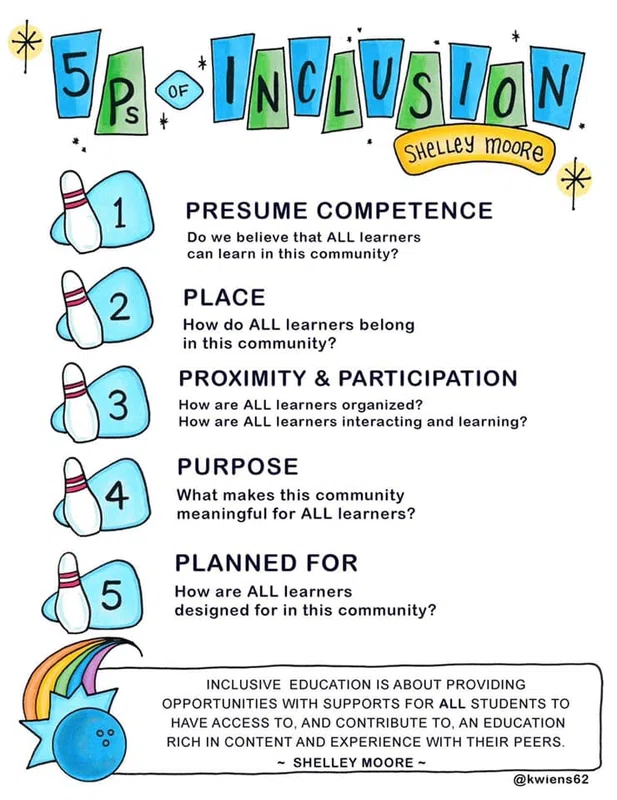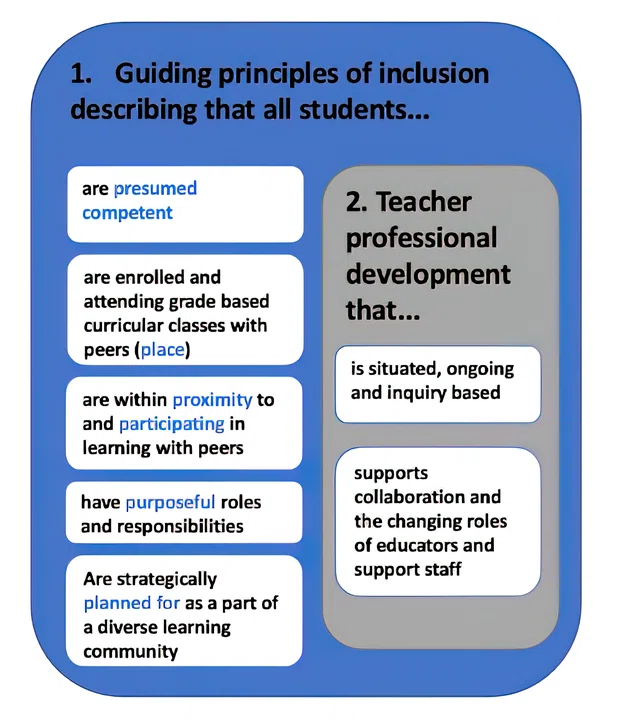
Association of Washington School Principals
Volume 2 – 2020-21

Leadership in Inclusion:
A Learning Series for Teams
New inclusiveness program aims to increase curricular access for all students
Shelley Moore
Inclusive Education Consultant, Five Moore Minutes
Evaluation Criteria: Creating a Culture, Planning with Data, Improving Instruction, Engaging Families and Communities, Closing the Gap
This article and AWSP’s partnership with Shelley Moore were made possible through funding from the OSPI Inclusionary Practices Project grant.
Enhancing the learning experiences of all students in inclusive classrooms is a long-standing focus of research and advocacy efforts of nearly three decades (Carter, Moss, Chung & Sisco, 2011). We know that the general education classroom is the preferred context for accessing the curriculum (Carter et al., 2007), and enrollment in inclusive classrooms, not only expands social opportunities, but creates a shared learning environment for both students with and without disabilities (Carter et al., 2015).
The Leadership in Inclusion Series is leading teams through the research and literature of what is currently being called for in the field of inclusive education and is supporting teams to take action in the ongoing quest for achieving equitable educational service delivery. The challenge is that classrooms and schools are becoming more diverse, not less, and concepts of inclusive education are moving away from just the educational experience of students with disabilities, and towards the transformation of the education system at large (Messiou, 2017). With an emphasis on infrastructure, teams involved in this series will collaboratively aim to implement effective strategies that enable schools to be responsive to increasing curricular access to all learners (Carter, Sisco, Melekoglu & Kurkowski, 2007; Spooner, Dymond, Smith, & Kennedy, 2006).
Throughout research, some guiding principles have emerged providing an inclusive infrastructure that can help to guide decision making processes at leadership levels. These themes include ensuring all students: (a) are presumed competent; (b) are enrolled in and attending curricular classes; (c) are learning within proximity to and participating in learning with peers; (d) have purposeful roles and responsibilities within classes; and (e) are planned for as a part of a classroom learning community. Figure 1 shows a graphic overview of the five guiding principles.
Figure 1: The 5 P’s of Inclusion

Although the five guiding inclusive principles are critical to consider when supporting inclusion from a student perspective, questions are also emerging about how to better support teachers and school teams to make a shift towards inclusive practices. The Leadership for Inclusion Series is also paying attention to the research that also shows how to better structure teacher professional development (PD) models that emphasize the changing roles of educators and shifting PD opportunities away from one size fits all and one-shot transmissive approaches, and moving to include more situated, ongoing and collaborative methods for teachers to inquire into their work (Butler, Schnellert & Perry, 2016; Harrower, 1999). Figure 2 displays the theoretical framework for the Leadership in Inclusion Series.
Figure 2: Theoretical Framework (Moore, 2021)

Every month between January and June 2021, 20 teams will be guided through one of the five principals and given time to reflect, ask questions and construct action plans for their own contexts. Aligning to each session will be a series of Five Moore Minute Videos and Podcasts, open to all, which will feature the collaborative teams and follow them on their inquiry over the next few months. With commitments to current professional development models and considering effective and wise practice connected to inclusive education, the Leadership for Inclusion Series is addressing topics that support the shift in classroom and school practices to become more universal, supporting communities of learners rather than individuals, and coming to the forefront of inclusive conversations with an aim of enacting equitable infrastructure that is good for all learners (Brownlie & Schnellert, 2009; Downing, Ryndak & Clark, 2000; Carter, Sisco, Melekoglu & Kurkowski, 2007; Harrower, 1999; Rose & Meyer, 2002).
We hope you follow along on our journey! ◼
Find us on
Association of Washington School Principals
Washington Principal | Volume 2 – 2020-21

